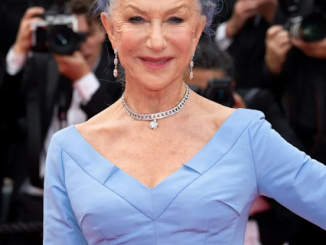Hunter McGrady is known as Sports Illustrated Swimsuit’s “curviest model ever.” But this milestone and other achievements weren’t enough to keep haters away. Now, she speaks about how she deals with them.
Meet Hunter McGrady.
Hunter McGrady is an American model and body positivity advocate renowned for her work in the fashion industry. Her breakthrough moment came in 2017. She was selected through an open casting call to appear in the Sports Illustrated Swimsuit Issue, making her debut as one of the magazine’s curviest models ever. This achievement marked a significant step in her career and highlighted her commitment to challenging conventional beauty standards.
McGrady’s influence extends beyond modeling. She is a vocal advocate for mental health, self-love, and body diversity. Through interviews, social media, and public appearances, she encourages people to embrace their bodies and reject unrealistic societal expectations.
The pivotal moment of her life.

McGrady’s career began as a model at the age of 15, during which she faced significant pressure to maintain a size two, leading to personal struggles with body image and self-acceptance. In a recent interview, she remembered that once she grasped the fact that being a slim fit wasn’t going to be her journey, she let herself live and be happy. Over time, she transitioned to plus-size modeling, finding her niche and voice in promoting body positivity and inclusivity within the fashion world.
It wasn’t an easy journey.

The Los Angeles native admitted that the road to acceptance was long, but therapy played a crucial role in her journey to self-love. She emphasized the importance of appreciating what our bodies can do rather than focusing on societal pressures to look a certain way.
“I think what Sports Illustrated is doing — celebrating all bodies — is so powerful. They’re doing the work. Especially right now when we’re entering this weird era, celebrating thinness,” McGrady noted.
But she keeps receiving negative comments about her body.

“No matter what you do, you’re going to get hate,” McGrady shrugged. “But you’re also going to get love. Negative comments or anybody who shames someone about their body? That’s so boring. Get something better to talk about.”
She emphasizes that criticism and negativity are inevitable, but so is support and appreciation. For McGrady, the act of body-shaming is tiresome and unproductive, reflecting more on the critic than the person being targeted. She encourages people to find more meaningful and positive topics of discussion, shifting focus away from superficial judgments.
Her message to plus-sized women.

McGrady stresses that self-love is the foundation of true confidence and resilience. Despite setbacks and challenges, the continuous effort to nurture self-love is crucial. Without it, external achievements and changes hold little significance.
“Confidence is not linear. It’s a climb,” she mentioned.
As the 60th-anniversary issue of Sports Illustrated Swimsuit hits newsstands, McGrady’s cover serves as a powerful reminder that beauty comes in all shapes and sizes. Through her journey and advocacy, she continues to inspire and promote a more inclusive and accepting view of beauty in the fashion industry and beyond.
Avoid Leaving Chargers Plugged In
If you’re anything like me, you probably have a collection of bad habits you aspire to change someday. They might not be particularly severe—after all, who doesn’t have something they wish they could improve about themselves?—but the fact is, these habits exist, and that’s completely normal.
For some individuals, addictions can hinder their efforts to eliminate undesirable behaviors from their lives. This could range from smoking and drinking to gambling or indulging in fast food. However, many habits stem from simple routines, meaning that there’s often nothing truly stopping you from making a change other than perhaps laziness or forgetfulness.
Take my personal experience as an example: I found it difficult to remember to unplug my phone charger from the wall when it wasn’t in use.
I can already hear you thinking: how hard can it be to unplug a charger once your phone is fully charged? The honest answer is, it’s not hard at all.
Still, I’ve lost track of how many times my partner has gently reminded me to disconnect the charger from the outlet. Until recently, I didn’t give it much thought (which, as you can guess, is part of the problem). After all, what harm is there in leaving the charger plugged in, just waiting for its next use? None, right?
As it turns out, that may not be entirely accurate. I came to realize this when I stumbled upon a social media post discussing the potential issues associated with leaving chargers plugged in when they aren’t actively charging a device.

Needless to say, I quickly changed my habits. Not only has my partner been pleased, but I also let go of my “habit” out of concern for the potential consequences of leaving it plugged in.
So, what are those potential consequences? Even when in standby mode, a charger still draws power. Sure, the energy consumption is minimal, but it still means you’re using electricity even when nothing is charging.
Additionally, leaving chargers plugged in can lead to premature wear on their internal components. Fluctuations in voltage can cause overheating, which might result in the charger smoking, and in the worst-case scenario, possibly even starting a fire.
Moreover, there’s the risk associated with the charger coming into contact with water or metal objects, which could create a full circuit.
If your household is anything like mine, you likely have children or pets wandering around. Beyond the chance of them damaging the charger by pulling it from the wall, there’s also the risk that kids might see it as a toy, increasing their curiosity about the outlet itself.

It’s important to note that most information suggests the risk of a plugged-in charger causing a house fire is extremely low, if not negligible. Modern safety standards and checks mean that leaving your charger plugged in should generally be safe, but it doesn’t account for the issues mentioned above, which you might want to keep in mind.



Leave a Reply